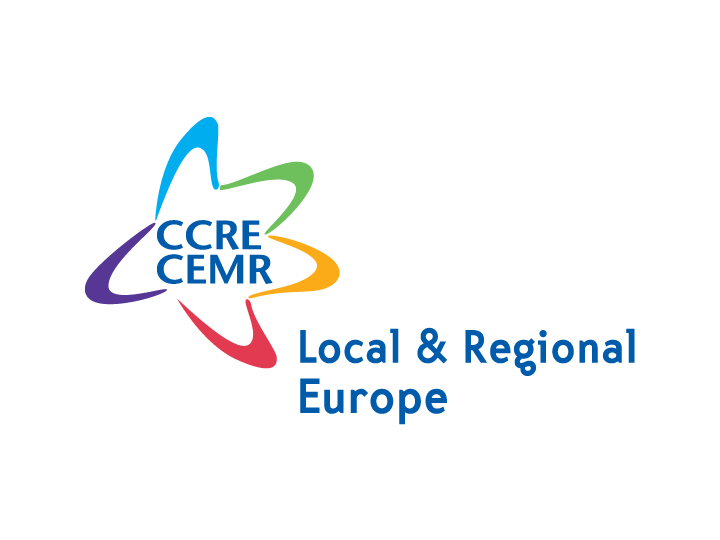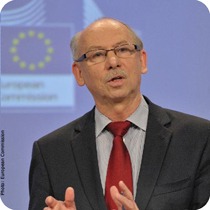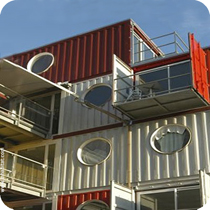CEMR interviews EU budget commissioner ahead of General Assembly
The commissioner will address the Congress participants on the final day of the General Assembly during a session entitled "Decentralisation, Democracy, Development – Which way forward for Europe? New perspectives through the 3D’s" from 11:15 to 13:00.
The interview is also available in Spanish.
In this crisis-ridden context, what message do you hope to bring to local and regional authorities at the occasion of the General Assembly of European Municipalities and Regions?
In our panel we will discuss the way forward for Europe. My message to CEMR and to the participants will therefore be very simple: in this period of crisis, when member states face economic difficulties, the EU budget can make a difference even though, at just 1% of the EU gross national income (GNI), it is rather small. But even relatively small sums of money can make a difference in hard times. And one euro spent at the EU level can generate up to fourteen euros on the ground. We have now, more than ever, focused the budget on growth and jobs. We believe that it is our contribution to the future.
Furthermore, the EU budget is really, directly or indirectly, a budget for Europe's local and regional authorities, for their small and medium enterprises and their inhabitants. The cost of running the EU (EU staff salaries, offices, translations, etc.) is less than 6% of the EU budget; therefore if less than 6% of the EU budget remains in "Brussels", then the remaining 95% or so must go somewhere. Well, via structural funds, grants to businesses and scientists, agriculture subsidies and others, over 90% of the EU budget goes back to Europe's towns and regions.
However the current negotiations on the next multiannual financial framework (MFF) should make the whole of Europe's local and regional governments worried: though almost 20 member states are against cuts, a handful of others, representing the so-called "net contributors" to the EU budget are adamant that the Commission's proposal must be cut. I consistently tell them that cutting future EU budgets will harm our towns and regions rather than EU institutions.
In Cadiz, I also plan to announce that the future financial rules will be simpler, more transparent and the procedures quicker. We are on track to cut red tape and make it easier, especially for those at local and regional levels, who have limited administrative capacity. Under the new rules, it will be the achievements that count, not the expenses. For example, a region could launch a specific training project costing €10 million to bring 20% of their inactive elderly people back to work. Neither the organisations running the different activities, nor the authorities would have to justify their expenses – the achievement of the project's milestones would be enough to unlock the EU funding.
As budget commissioner, why is it important for you to address local and regional authorities directly by attending and speaking at this Congress?
It is the importance of European regions and municipalities in the European architecture. Among us politicians, they are the closest to those who matter most, to the European citizens, whom we all serve. This is the most important commandment of our democratic system. Some 70% of all EU legislation is implemented at the local or regional levels. The EU budget is a budget for Europeans; its substantial part is directed towards regions, municipalities, towns and villages.
As the commissioner responsible for financial programming and budget, I would like to have a useful exchange of views on how to make use of the common Union resources to best serve the interests of the European citizens in their most immediate surroundings. The Commission underlines that solidarity with less developed regions and member states must remain a basic principle of the next EU budgets, as reaching a genuine single market is one the Union's main goals. Yet I want to encourage our partners to focus their efforts on using EU money on a priority basis, where it brings EU added value.
I consider this discussion essential as we are reaching the decisive moments in the MFF negotiations and in the adoption of legislation which would shape EU funding in the next seven years. I believe that local and regional elected representatives are the voice of those who benefit from the common EU budget and for whom it is important especially in these hard times to support growth and employment perspectives. They have direct contact with voters as they are in many cases their neighbours, friends, fellows or schoolmates. It is for these reasons I would like to support and help make their voices heard by those involved in the decision-making process.
In what way do you think the European Union can help find a solution to this crisis?
If I were to list all the measures the European Commission has already proposed since the inception of the crisis, it would probably require a specific seminar! Apart from the measures we have put on the table and which on occasions had been rejected by some, I would react to the element of finality and future in your question.
27 member states have reached the conclusion that we have been stating for over a year: savings won't take us out of the crises. While looking for savings, we have always stressed that the investments from the EU budget are the catalyst for growth and a needed impulse in these hard times. I believe this is also an opportunity for municipalities and regions to use the available funding under the current financial framework. The next MFF should then be seen as an investment in the future, in the expected post-crises situation. When we decide about the next seven years we have to look beyond the immediate horizon. This is what I constantly tell national governments.
More integration at the level of the Union in financial and banking matters is our recipe for a long lasting solution to the crisis. A deepening economic and monetary union is one of the major remedies. Following this line, the Commission presented last week the proposals for a single European supervisory mechanism, which will be a major step towards a banking union. This new system should restore confidence in the banks throughout the euro area. As President Barroso put it, the Commission wants "to break the vicious link between governments and their banks. In the future, bankers' losses should no longer become the people's debt, putting into doubt the financial stability of whole countries."
The crisis also made us think in broader terms about the future of the Union. Our Europe 2020 strategy should guide the EU to become a smart, sustainable and inclusive economy. Our budget proposals are already supporting these goals. The economic and financial crises also exposed some political challenges. The Economic and Monetary Union depends on the political structure supporting it. The question of a political union and the European democratic principles behind it naturally comes on the agenda.
I am glad that these basic questions are on the agenda at CEMR's General Assembly, to which I look forward.
rn

Climate, Sustainable Finance Officer






